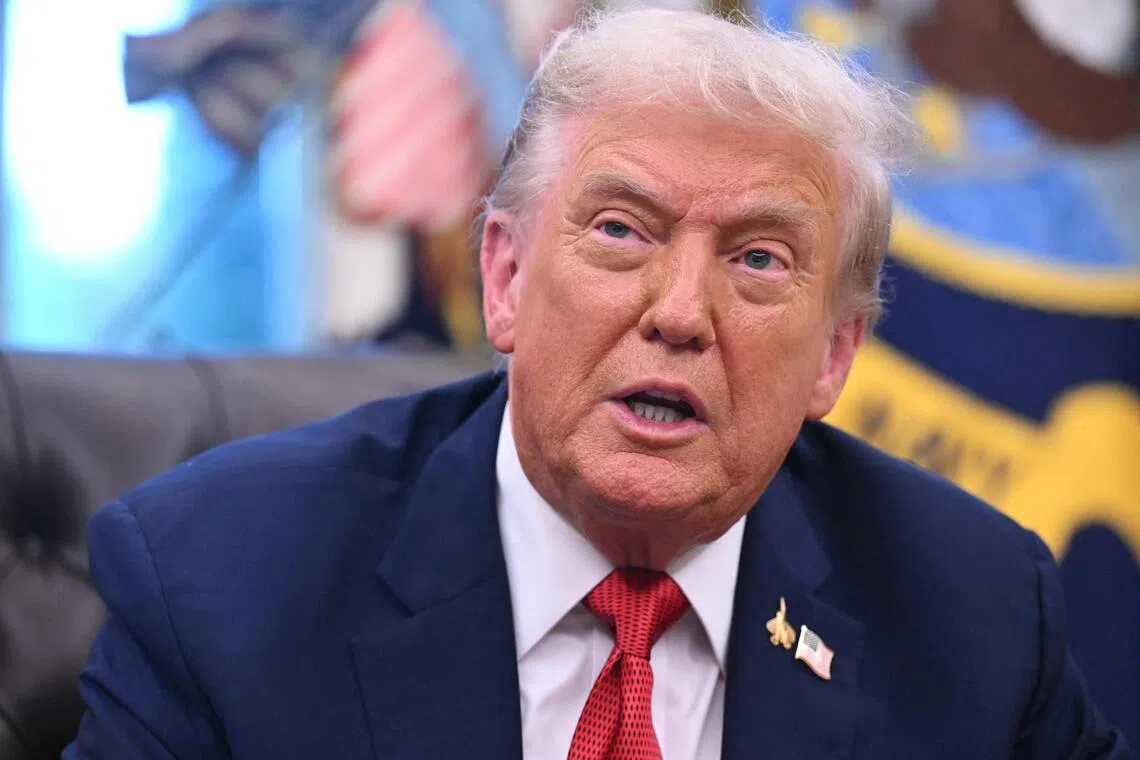Trump argues in formal appeal that his falsified business records conviction was ‘fatally marred’
Sign up now: Get ST's newsletters delivered to your inbox

US President Donald Trump's 96-page appeal is an effort to scrub away the stain of his 34 felony convictions.
PHOTO: AFP
Jonah E. Bromwich
Follow topic:
NEW YORK – US President Donald Trump late on Oct 27 formally appealed his New York criminal conviction, arguing that the trial was “fatally marred”, that jurors considered evidence that should have been off-limits and that the judge made crucial mistakes.
With the 96-page appeal, filed in 1st Department of the state Supreme Court’s Appellate Division at about 11.30pm local time, Mr Trump began the legal effort to scrub away the stain of his 34 felony convictions. In spring 2024, a jury found him guilty of approving a scheme to falsify business records to conceal a hush-money payment made on his behalf during the 2016 election.
That payment, the last in a series, was made by Mr Trump’s former fixer, Michael Cohen,
The case, brought by the district attorney, Mr Alvin Bragg, depended on a novel and complex legal calculation that has engendered scepticism among some experts since the charges were unveiled in the spring of 2023.
Falsifying business records is a felony only when the records were faked to conceal – or commit – another crime. Mr Bragg’s prosecutors said that by approving the falsification, Mr Trump sought to conceal violations of a state election law. That law bars conspiring to promote a person’s election by “unlawful means”.
The President’s lawyers seize on that reasoning in their appeal.
“The DA concocted a purported felony by stacking time-barred misdemeanours under a convoluted legal theory, which the DA then improperly obscured,” Mr Trump’s lawyers, a team from the firm Sullivan and Cromwell, wrote in their brief.
“This case should never have seen the inside of a courtroom, let alone resulted in a conviction.”
A spokesperson for the district attorney’s office did not immediately respond to a request for comment.
Mr Bragg has said that the unusual charges matched Mr Trump’s unusual conduct. The district attorney’s office is expected to file a lengthy reply to the appeal.
Since winning the conviction, the first-ever of an American president, Mr Bragg has rarely discussed the case, and the specifics of the accusations have all but disappeared from public conversation, even as the President’s critics and political opponents often refer to him as a convicted felon.
Mr Trump’s appeal lists five overarching reasons the conviction should be overturned. It says:
That federal election law supersedes the state law that Mr Bragg’s case depended on.
That the trial judge, Mr Juan M. Merchan, improperly allowed the jurors to consider official presidential acts, for which the Supreme Court – several months after the trial – declared the president could not be prosecuted.
That Judge Merchan erred in telling the jury that it did not have to agree on the “unlawful means” to which the state election law referred. (The district attorney’s office provided several choices.)
That the prosecution never established that Mr Trump had the “intent to defraud” that the false business records charge requires.
And, finally, that Judge Merchan should have recused himself, having donated US$15 (S$19) earmarked to former president Joe Biden’s 2020 campaign against Mr Trump and US$20 to political action committees.
Mr Trump has tried some of those arguments in the past. Before the trial, his defence lawyers sought Judge Merchan’s recusal several times only to be rebuffed by the same court he is now seeking to persuade.
But the appellate judges are likely to weigh some of the other issues carefully – including the use of the federal election law and Judge Merchan’s jury instructions. Arguments about Mr Trump’s immunity from prosecution could be useful if the appeal eventually reaches the US Supreme Court.
It could take a long time to get there. The 1st Department has taken its time with cases involving the former president.
When Mr Trump appealed the results of a civil fraud case in which he was found liable in July 2024, the court did not reach a decision until more than a year later. Even then, the panel could not agree on whether to overturn or uphold the trial court’s findings. Instead it reached a shaky deal that allowed that appeal to move to New York’s highest court.
Mr Trump’s new appeal, of his criminal case, could ultimately be headed there as well, given the complex legal issues at play and the case’s inherently political nature.
But the president’s lawyers have also sought a shortcut. In June, they asked a federal appeals court to take over the case. If it does, Mr Trump may be able to take his case to a favourable Supreme Court more quickly. That ruling is still pending. NYTIMES

